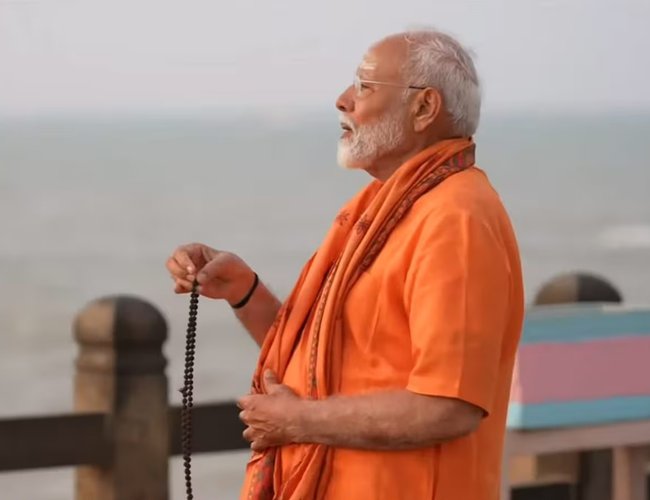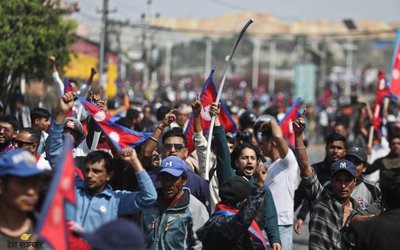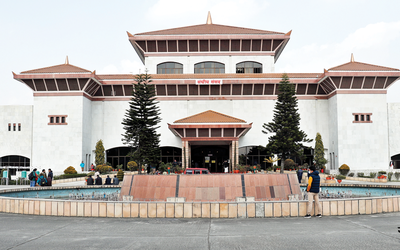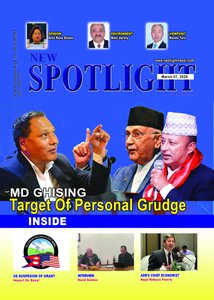
In the 2024 Indian general elections, did Modi snatch victory from the jaws of defeat or vice versa? Debate is rife and polarized, not just in India but also in Nepal. One view among those who dislike Modi is that he has indeed been humbled from the high absolute majority of 2019, that the Indian parliament is no longer opposition-less as before, that of course being a good thing for democracy. Another lot holds that he and his BJP might have slipped in the largest state Uttar Pradesh, but with total victory in the central belt states and inroads into the south – and the fact that not only has his National Democratic Alliance (NDA) won a comfortable majority overall but BJP’s tally alone is bigger than that of the Congress-led I.N.D.I.A. alliance – Modi is very much unchallenged.
A waggish Indian social media posting put it succinctly: Modi and NDA are forming the government for the third consecutive term, an outstanding feat only Jawaharlal Nehru had managed previously; Congress doubled its seats and established Rahul Gandhi (with his foot march across India) as a genuine leader; regional parties like Akhilesh’s Samajwadi in UP, Mamta’s TMC in Bengal, and others in Maharashtra and the south have done remarkably well; and even the Electronic Voting Machines (EVMs) have emerged victorious withaspersions on their being tampered with quashed by the results. Indeed, a win-win for all that only the world’s largest democracy could have assured!
The losers have been mainly the servile corporate media and their exit pollsters (with the exception of CSDS-related Yogendra Yadav) whose credibility is currently mud. But all said and done, it has been a climb-down for Modi and his bombastic rhetoric as well as personality cult build-up, a case of being a prisoner of his own hype. Nepalis who have closely followed India for many years – journalists like Yubaraj Ghimire and Krishna Prasad Sigdel, political analysts like Hari Sharma Bharat Dahal and Jason Vaidya coming from different ends of the political spectrum – have chimed in with their views. Investigative journalists like J.B. Punmagar travelled from Sikkim through north Bihar and UP to Uttarakhand and Delhi before the elections to gauge the Indian public mood and came to practically the same (accurate) conclusion as Yogendra Yadav. Less formally, Nepalis have spoken with friends and relatives across the border in UP, Bihar, Sikkim, Delhi and other places in India, and have their own stories to share why Modi and his BJP failed to live up to the hype. And the gist of all that is as follows.
Showman Hubris: Democracy is about attracting the masses, and nothing succeeds like Bollywood which permeates India’s social life. But it takes you only so far – as has been seen in the other Hollywood-based democracy too. Lack of effective opposition to Modi in the last ten years and over-reliance on the power of state power to manage roadshows bred within the BJP not just organizational complacency but self-hypnosis as well that prevented genuine grassroots concerns from filtering up to the top leadership.
Everything was built around the personality of Modi, with sycophants dominating the show within the party as well as the mainstream corporate media whose masters had a vested interest in preserving their crony capitalism interests linked to state power. That hubris had similarly crippled Indira Gandhi in 1977 (“Indira is India!”, remember?), a lesson that BJP should have learned but seems to have forgotten.
Money Blindness: Money does play an important role in mass politics (just look at the PACs of the US!) to organize meetings, buy media time and so on; but it has its limits. It served Modi well in 2019 when he had decimated the opposition’s war chest by his demonetization of Indian currency, making the opposition’s cash hoard worthless paper. This time around, Modi not only introduced the dubious “electoral bonds” for slush money but also used state anti-corruption agencies to block legitimate bank accounts of the opposition. It forced the opposition to fall back on grassroots tactics (Rahul Gandhi’s Bharat Jodo padyatra) and moral issues of inclusive economic policies, leading to their success.
What he forgot– as per not just older Hindu Samkhya philosophy but also modern scholars of power such as Steven Lukes – was that power comes in three interlinked forms: coercive (tamasik) power of the state, persuasive power (rajasik) of the market, and the moral power (satwik) of genuine civic movements. And of these three, if one does not command the satwik power of moral heights, the other two become near useless. Mahatma Gandhi’s tamasik and rajasik powers were negligible compared to that of the British Empire he was opposing; but his satwik power ultimately overwhelmed the Raj. Closer to our times, Modi should have remembered how Jayaprakash Narayan succeeded against Indira Gandhi in 1977 or Anna Hazare against Congress corruption in 2011.
Shifting voter loyalty: A Muslim activist friend in Gorakhpur explained to me how Modi massively won UP in 2019 without even putting up a single Muslim candidate where every fifth voter is a Muslim. Muslim men votes were split between Mayawati, Akhilesh or the Congress: Muslim women en masse voted for the BJP. Why? Well, anti-triple talaq legislation that empowered women! Alas, old merchandise cannot be sold twice, and they went back to voting for Akhilesh!
Voters, especially the young, were concerned more this time around with issues of unemployment and growing income inequality where India’s massive economic growth has only favoured the rich and not the poor. Modi tampered with army recruitment with his Agniveer proposal. Despite expanding cooking gas access gift to the poor and so on, he has been less supporting of broader socialist concerns and more a champion of big business interests. His proposal to corporatize agriculture would help the Adanis and cripple the small farmers and their rural mandis. That revolt was what the opposition effectively cashed in on.
Narrow Hindutva: Hinduism is really not a religion but a supermarket of many religions and paths that differ more from each other than Muslims differ from Christians. Modi and his BJP championed one brand that goes against the Hindu practices of others, including Tantrik/Shaivite/Buddhist-mixed Nepal, Bihar, Bengal, Assam and South India. His personalizing Ram Mandir at Ayodhya irritated even the Shankaracharyas. Even more serious it is whispered, the awarding of major construction contracts in Ayodhya and Varanasi to Amit Shah’s Gujrati cronies angered small businesses across UP. BJP after all like its original avatar the Jan Sangh is a shopkeepers’ party; and ignoring Yogi Adityanath’s candidates in favour of Amit Shah’s led to his and RSS stepping back with consequences we all see.
What would all this mean for Nepal in the days ahead?
Opinion is divided: Modi haters think his humbling comeuppance is a good thing for Nepal as it puts him and his Hindutva on a backfoot. Those who appreciate what he has managed to do for India but distrust him for his Nepal blockade and other policies think he might emerge more aggressive in the neighbourhoodto pander to his domestic constituents. I fall in the latter category.
First, as so brilliantly mentioned by photo journalist and businessman Bikas Rauniar at the J.B. Punmagar talk mentioned above, 1950 Treaty and EPG report notwithstanding, Modi government has put in place regulations that make it impossible for Nepalis to do business in India. That path a weakened Modi beholden to Bihari support will pursue more aggressively.
Second, BJP and RSS would like to see Nepal declared a Hindu state but without the King as “King does not listen or look after Indian interests”. After all it was BJP Vajpayee government that molly-coddled the Noida Maoists against the King way back in June 2002 (despite his own foreign minister Jaswant Singh declaring them terrorists) as so brilliantly described by S.D. Muni in Nepal in Transition. Modi will continue that policy of working with servile Nepali lampasarbadi politicians to further narrow Indian interests (with the support of the Congress which ultimately sidelined the monarchy), something that Nepal’s traditionalists and monarchists have understood well but not the parties or party-beholden media. Even within India, a broader Hindu resurgence will continue despite BJP and its narrow politicization, until a new ecumenical Dara Shikoh emerges to chart a synthesized syncretic path.
Third, his key ministers are a continuation, not a break from the past. Nor is his “coronation” ceremony at Rashtrapati Bahavan which is reminiscent of the 1911 Delhi Durbar: it is a reminder to the neighbourhood that India is a successor state to the British Raj sharing the same governance ethos with its colonial overtones. It expresses itself in a self-damaging Sinophobia vis-à-vis Nepal and Bhutan and Islamophobia as well that has led Modi to coddle close to Israel’s Netanyahu against Global South opinion (supplying him arm that he uses in Gaza and Rafah). It has led to not just SAARC but other regional initiatives remaining comatose, which unless revived will not enhance India’s international image. He has also pursued a policy of piggy-backing on the US to counter China, which has damaged India’s standing among BRICS members as well as the Islamic world.
How Jaishankar’s recent statements distancing India from the Indo-Pacific (when it comes to Russian oil) will play out, how a humbled Modi might be forced to be more realistic regarding the neighbourhood is yet to be seen. But with a lampasarbadi Nepali Loktantrick leadership, no bold diplomatic initiatives can be expected from this side!

Dipak Gyawali
Gyawali is Pragya (Academician) of the Nepal Academy of Science and Technology (NAST) and former minister of water resources.
- Re-Thinking Democracy: Why South Asians Are worried
- Mar 17, 2025
- Nepal’s Governance Mired In Endemic Corruption
- Feb 20, 2025
- What Might The Age Of Trump Look Like?
- Jan 22, 2025
- Kathmandu Dialogue With Dugin
- Dec 25, 2024
- Bioregionalism Satsang
- Sep 27, 2024














